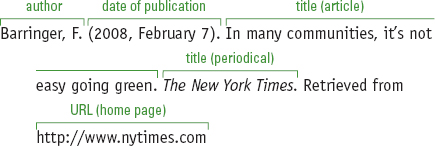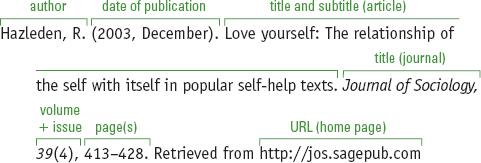Digital written-word sources
Updated guidelines for citing digital resources are maintained at the APA’s Web site (www.apa.org).
24. article from an online periodical. Give the author, date, title, and publication information as you would for a print document. Include both the volume and issue numbers for all journal articles. If the article has a digital object identifier (DOI), include it. If there is no DOI, write Retrieved from and the URL for the periodical’s home page or for the article (if the article is difficult to find from the home page). For newspaper articles accessible from a searchable Web site, give the site URL only.

Cleary, J. M., & Crafti, N. (2007). Basic need satisfaction, emotional eating, and dietary restraint as risk factors for recurrent overeating in a community sample. E-Journal of Applied Psychology, 2(3), 27–39. Retrieved from http://ojs.lib.swin.edu.au/index.php/ejap/article/view/90/116
25. article from a database. Give the author, date, title, and publication information as you would for a print document. Include both the volume and issue numbers for all journal articles. If the article has a DOI, include it. If there is no DOI, write Retrieved from and the URL of the journal’s home page (not the URL of the database). The source map on pp. 476–77 shows where to find this information for a typical article from a database.

Morley, N. J., Ball, L. J., & Ormerod, T. C. (2006). How the detection of insurance fraud succeeds and fails. Psychology, Crime, & Law, 12(2), 163–180. doi:10.1080/10683160512331316325
26. abstract for an online article. Include a label.
Gudjonsson, G. H., & Young, S. (2010). Does confabulation in memory predict suggestibility beyond IQ and memory? [Abstract]. Personality & Individual Differences, 49(1), 65 – 67. doi:10.1016/j.paid.2010.03.014
27. report or long document from a web site. Include all of the following information that you can find: the author’s name; the publication date (or n.d. if no date is available); the title of the document, italicized; and Retrieved from and the URL. Provide your date of access only if an update seems likely. The source map on pp. 480–81 shows where to find this information for a report from a Web site.

28. chapter or section of a web document.Follow model 27. After the chapter or section title, type In and give the document title, with identifying information, if any, in parentheses. End with the date of access (if needed) and the URL.
Salamon, Andrew. (n.d.). War in Europe. In Childhood in times of war (chap. 2). Retrieved April 11, 2008, from http://remember.org/jean
29. short work from a web site.Include the name of the work (with no italics) and the name of the site, italicized.

30. online book.Give the original print publication date, if different, in parentheses at the end of the entry.
Russell, B. (2008). The analysis of mind. Retrieved from http://onlinebooks.library.upenn.edu/webbin/gutbook/lookup?num=2529 (Original work published 1921)
31. email message or real-time communication.Because the APA stresses that any sources cited in your list of references be retrievable by your readers, you should not include entries for email messages, real-time communications (such as IMs), or any other postings that are not archived. Instead, cite these sources in your text as forms of personal communication (see p. 462).
32. online posting.List an online posting in the reference list only if you are able to retrieve the message from an archive. Provide the author’s name, the date of posting, and the subject line. Include other identifying information in square brackets. End with the retrieval statement and the URL of the archived message.
Troike, R. C. (2001, June 21). Buttercups and primroses [Electronic mailing list message]. Retrieved from http://listserv.linguistlist.org/archives/ads-l.html
Wittenberg, E. (2001, July 11). Gender and the Internet [Newsgroup message]. Retrieved from news://comp.edu.composition
33. blog (web log) post
Spaulding, P. (2010, April 27). Who believes in a real America? [Web log post]. Retrieved from http://pandagon.net/index.php/site/2010/04
34. wiki entry.Use the date of posting, if there is one, or n.d. for “no date” if there is none. Include the retrieval date because wiki content can change frequently.
Happiness. (2007, June 14). Retrieved March 24, 2008, from PsychWiki: http://www.psychwiki.com/wiki/Happiness